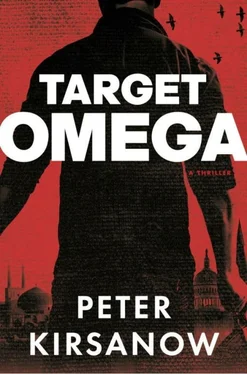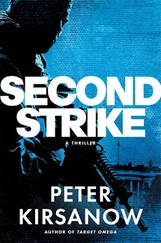“It most assuredly would cause an earthquake to the world economy,” Brandt agreed. “But, sir, have you considered the very real prospect that Russian strategy is to profit — both geopolitically and economically — from the quake?”
Marshall’s face registered a mixture of befuddlement and curiosity. “How in hell could they do that?”
“Do you remember the previous administration’s summit with Mikhailov in Germany two years ago?
“The Mainz Accords.”
“Right. Clarke tried to score political points in advance of the election by engaging Russia. The theme was that after the Syrian chemical weapons affair, Russia was no longer an adversary; it was a partner.”
Marshall snorted derisively.
“The Mainz Accords,” Brandt continued, “were the capstone of Clarke’s engagement effort. A series of trade agreements representing by far the largest commercial transaction between the two nations in history. It would revive both our economies and permanently reset our relationship for the positive.”
“Lots of words on a piece of paper. But it went nowhere. The Russians produced a ton of product, but nothing that we wanted or needed.”
“So we think.”
Marshall’s eyes narrowed. “You’ve lost me. Where are you going with this, Jim?”
“As soon as the ink dried on the Mainz Accords, Russian factories started spitting out mountains of equipment: generators, switches, circuit breakers. Ms. Perry tells me they’re just sitting there in these immense warehouses. You’re right. We didn’t need them. Nobody’s buying them. And the Russians aren’t even trying to move them.”
“It takes a while to get the hang of capitalism,” Marshall said.
“They also built lots of cargo vessels, cargo containers, trucks, and the like. Presumably to transport product they seem to be in no hurry to sell, let alone ship, anywhere.”
A flicker of understanding played on Marshall’s face. “If it weren’t for the Mainz Accords, we would’ve been awfully curious about why the Russians were producing so much stuff that apparently was going nowhere. Instead, we chalk it up to market ineptitude, a modern Russian version of the Soviet-era five-year plans. So we don’t suspect something’s afoot.”
“Think about what the product might be good for. It’s unremarkable, standard-grade material. But if an EMP were to go off and the power goes out…”
“It becomes the most indispensible standard-grade material on the planet,” Marshall finished. “The Russians will step into the breach and save our ass.”
“Food and essentials won’t spoil or rot, because they’ll be transported to distant American populations by our benevolent Russian friends in their trucks and cargo containers. Fried cars, planes, factories, offices won’t be rendered idle, at least not for long. Russian-supplied parts and generators unaffected by the EMP will get them restarted. Heck, they’ll restart all of our essentials, from hospitals to factories to power plants.”
Marshall exhaled audibly. “And a desperate US will pay virtually any price and obey virtually any command to get restarted.” Marshall’s words came slowly and softly. “They’ll set the terms, Jim. They’ll have rescued us from utter destruction, mass starvation, and we, in turn, will effectively become a vassal state.”
Brandt forced a chuckle. “A wee melodramatic there, Mr. President.”
“Maybe so. But I see your point, Jim. This may not be so far-fetched after all. They’d be softening the global economic impact of the strike.”
“Again, it’s just conjecture, sir.”
“That would make me feel better, Jim, if your conjectures didn’t so often come true.”
“It was actually my aide, Ms. Perry, who came up with this. Connecting a million disparate dots. Again, this truly is guesswork, a shot in the dark. It’s conceivable that we’re being fed that EMP intel as a diversion. The Russians are particularly good at getting people to chase down multiple rabbit holes.
“But I do think we should call Prime Minister Chafetz with our EMP intel. I still believe it’s wise not to editorialize — not to state, for example, that they’re definitely the target, or that Iran is the actor. It would be helpful to tell him that Mikhailov assures us Russia’s not going to hit us. Chafetz knows Iran can’t hit us, so he’ll conclude on his own that Iran plans to hit Israel.”
“But we won’t be the ones who say it,” Marshall affirmed.
“Right. If they decide to hit Iran, it’s their decision. If their conclusion is wrong, it’s not our fault. But if they hit Iran and prevent a strike on Tel Aviv, well… then we will have provided the critical intel that saves Israeli lives.”
“Jim, I’m inclined to offer to have the Fifth Fleet on standby to provide any support he may need. Too provocative toward the Iranians?”
“On the contrary, it may not go far enough.”
NORTHERN VIRGINIA
JULY 17 5:32 P.M. EDT
Garin was proceeding north on I-95 toward Washington after disconnecting with Olivia, but the rush-hour traffic was at its usual crawl. He placed a call to information using the SUV’s hands-free feature and requested the general number for the Hart Senate Office Building. Within moments, he was connected and an operator cheerfully answered, “Hart Senate Office Building. How may I direct your call?”
“Julian Day.”
“One moment, please.”
A few seconds later: “Office of Chief Counsel.”
“May I speak with Mr. Day, please?” Garin asked.
“I’m sorry. Mr. Day has left for the day. Can I take a message or send you to his voice mail?”
“No, thank you. Do you know if I can reach Mr. Day at home?”
“I’m sorry, sir, I can’t provide you with that information.”
“I understand,” Garin said. “This is Dan Dwyer.”
“Yes, Mr. Dwyer. How are you?”
“Fine, thank you. Mr. Day asked me to get in touch with him immediately if I heard from a man by the name of Mike Garin.”
“Okay.”
“Well, I was just in contact with him regarding a matter of some urgency. I need to contact Mr. Day at once.”
“Of course, Mr. Dwyer. I’m sure Mr. Day will want to speak with you right away. He’s at home. I can connect you to his cell or home number.
“Mr. Dwyer?”
NORTHERN VIRGINIA
JULY 17 5:45 P.M. EDT
Garin drove down a quiet, tree-lined street sporting modest but elegant houses occupied by some of the junior to midlevel consultants, lawyers, and lobbyists who made their livings, directly and indirectly, from the US Treasury. Julian Day’s home was two blocks down on the left.
Garin had spent an exasperating couple of hours on I-95, the traffic at a near standstill due to a single vehicle disabled by an overheated radiator. Maybe he should’ve found some way to use one of DGT’s helicopters after all. While he waited for the traffic to lighten, he had plenty of time to think about how he would approach Day, but he actually didn’t need it. He knew there was no time for subtlety.
He came to Day’s house, a two-story redbrick affair with a small detached garage in the rear. His neighbors’ houses were at least fifty to sixty feet away on either side. Close, but not so close that anyone could overhear a normal conversation or moderate level of noise.
Garin drove past the house and continued for two blocks before making a left turn to circle the block and make another pass. He saw nothing to suggest Day’s house was being watched by anyone else or that he was the subject of any other form of surveillance.
Читать дальше












